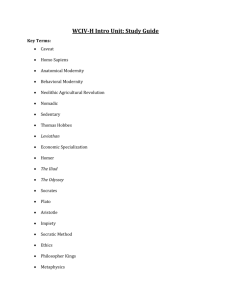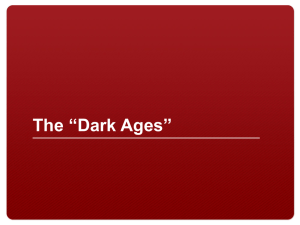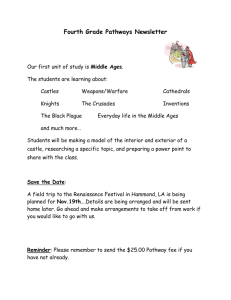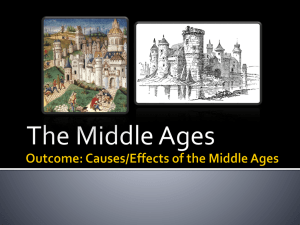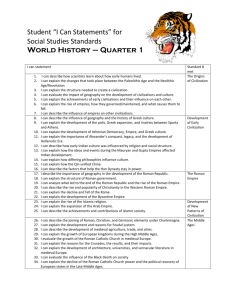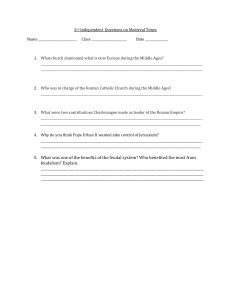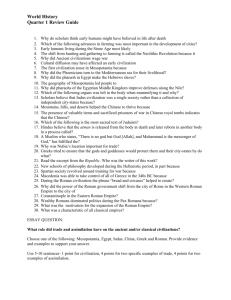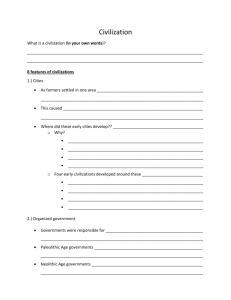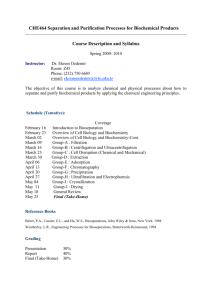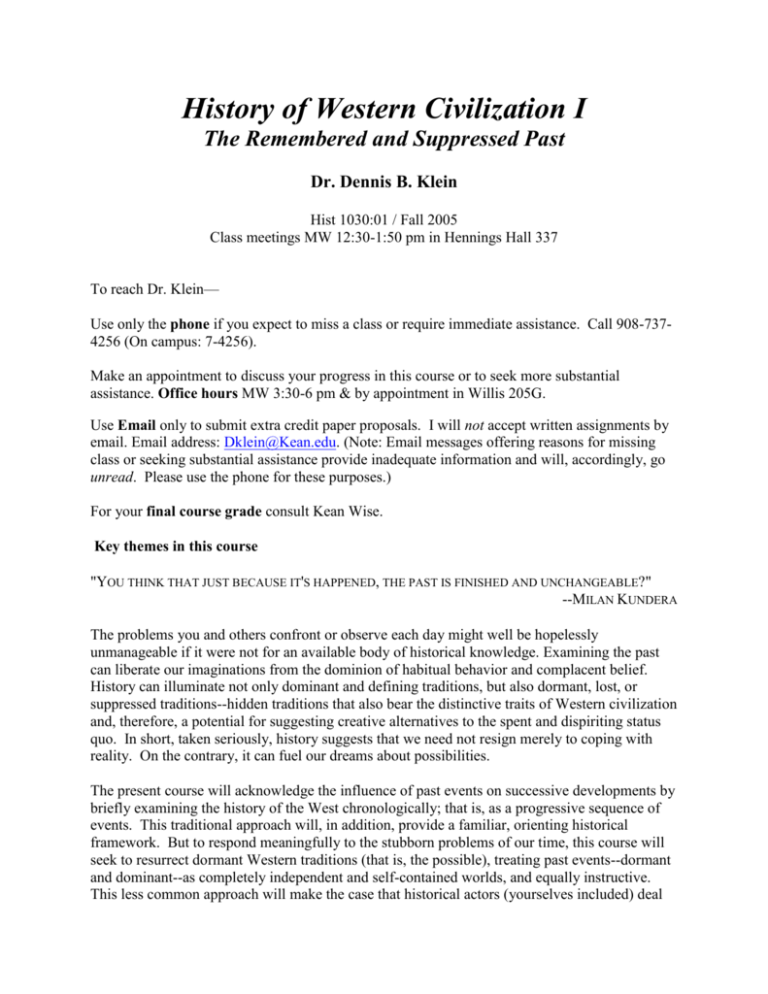
History of Western Civilization I
The Remembered and Suppressed Past
Dr. Dennis B. Klein
Hist 1030:01 / Fall 2005
Class meetings MW 12:30-1:50 pm in Hennings Hall 337
To reach Dr. Klein—
Use only the phone if you expect to miss a class or require immediate assistance. Call 908-7374256 (On campus: 7-4256).
Make an appointment to discuss your progress in this course or to seek more substantial
assistance. Office hours MW 3:30-6 pm & by appointment in Willis 205G.
Use Email only to submit extra credit paper proposals. I will not accept written assignments by
email. Email address: Dklein@Kean.edu. (Note: Email messages offering reasons for missing
class or seeking substantial assistance provide inadequate information and will, accordingly, go
unread. Please use the phone for these purposes.)
For your final course grade consult Kean Wise.
Key themes in this course
"YOU THINK THAT JUST BECAUSE IT'S HAPPENED, THE PAST IS FINISHED AND UNCHANGEABLE?"
--MILAN KUNDERA
The problems you and others confront or observe each day might well be hopelessly
unmanageable if it were not for an available body of historical knowledge. Examining the past
can liberate our imaginations from the dominion of habitual behavior and complacent belief.
History can illuminate not only dominant and defining traditions, but also dormant, lost, or
suppressed traditions--hidden traditions that also bear the distinctive traits of Western civilization
and, therefore, a potential for suggesting creative alternatives to the spent and dispiriting status
quo. In short, taken seriously, history suggests that we need not resign merely to coping with
reality. On the contrary, it can fuel our dreams about possibilities.
The present course will acknowledge the influence of past events on successive developments by
briefly examining the history of the West chronologically; that is, as a progressive sequence of
events. This traditional approach will, in addition, provide a familiar, orienting historical
framework. But to respond meaningfully to the stubborn problems of our time, this course will
seek to resurrect dormant Western traditions (that is, the possible), treating past events--dormant
and dominant--as completely independent and self-contained worlds, and equally instructive.
This less common approach will make the case that historical actors (yourselves included) deal
2
with reality by summoning not only history's lessons--the traditions we readily inherit-- but also
suppressed, half-forgotten, "irrelevant" traditions that possess a power to change the course of
events.
This course is divided into two, overarching themes: the rise and the fall of civilizations in the
West. When considering the rise of Western civilizations, we will be examining five topics and
their case studies:
The mystery of durable empires (the Roman Empire)
The lost art of personal and community loyalty (early Middle Ages)
The birth of a "social conscience" (early classical Greece)
The invention of the "self" (the Renaissance)
The modern origins of natural or civil rights (the Reformation)
When considering the fall of Western civilizations, we will be looking at four topics::
The paradox of "holy war" (the high Middle Ages)
Warfare and its addictive effects (late classical Greece)
Epidemic skepticism and its cultural consequences (late Middle Ages)
The heroic experiment of democratic-republics (the Roman Republic)
It is my hope that this course will enrich your historical imagination and prepare you to deploy it
toward addressing, if not remedying, socially urgent, real-life problems.
Required reading available for purchase at the university bookstore (except for Klein):
Klein, Dennis B., comp. Western Civilization: A Romance with Power / A Source
Reader. Union, NJ: Kean University, 2004. Distributed to students at no cost.
Machiavelli, Niccolo. The Prince. Indianapolis: Hackett Publishing Co., 1995.
Tuchman, Barbara. A Distant Mirror: The Calamitous 14th Century. New York: Random
House, 1978.
Optional reading:
Donald Kagan, et al., The Western Heritage, Vol. 1 (to 1715) (8th ed. or later). Available
for purchase in the University Center bookstore. Lectures will be based on Chapters 1-12
in The Western Heritage. At your option, you may read these chapters to reinforce class
lectures or to make up for incomplete class lecture notes.
Course philosophy, requirements, and grade distribution:
3
As with any course I teach, I believe the fundamental value of this course, in addition to its
content, is its emphasis on close reading of primary texts and a thoughtful and documented
criticism of them both in class and in writing. To achieve these objectives, I require my students
to engage in a three-part intellectual progression: (1) carefully read and take notes on all
assignments, highlighting for each reading its major themes, key passages, new words, and your
own questions; (2) participate in class discussions, referring to readings and your notes (in any
particular class, you should never feel satisfied until you understand the material and its
significance; (3) in preparation for take-home exams, review your notes to strengthen
comprehension and to discern broad historical themes for each part of the course.
Requirements
Grade distribution
Take-Home Exam on Part I
Take-Home Exam on Part II
Two two-page response papers
Oral reports on assigned reading and other targeted assignments
35% *
35% *
20%
10%
* Essay exam grades will take class attendance and participation into consideration. See below.
A note on oral reports Oral reports are scheduled reports in class. Everyone is responsible for
reading each assignment in advance and should be prepared to evaluate its argument critically,
but each one of you will have the chance to open discussion on a particular article. In these oral
reports, you must seek to define the reading’s main arguments, select “quotable” passages and
explain why they’re important, consider unfamiliar terms, and question aspects of the author’s
argument. For complete credit, you must submit hard copy of a completed “In-Class Oral
Report” on the day of your report. Forms are located in your Source Reader.
Submitting response papers It is important that you immediately reserve two evenings for
lectures by visiting scholars. Organized by the Jewish Studies program, these two lectures
address topics that are related to the themes of this course. Your attendance is mandatory and
will be monitored. Each response paper must document the relationships between lecture themes
and course themes. Due dates are one week after the lecture. The two lectures and their dates
and locations are:
“Nostra Aetate at 40,” an examination of the October 28, 1965 landmark Vatican
ecumenical declaration that eased relationships between two historical adversaries in the
West, Catholics and Jews. Academy Award-nominated film, Sister Rose’s Passion; a
conversation with its director, Oren Jacoby; and a panel discussion by Rabbi Irving
Greenberg and Father John Pawlikowski. Relates broadly to the course theme, the
consolidation of civilizations, and specifically to the rise of the Church in the early
Middle Ages and its paramount role in Western civilization. Monday, October 31st at
8:00 pm in the Kean Hall Conference Center.
4
“How Free Is Free Speech?,” an exploration into the perils and prospects of free speech
in the press and in the academy. Lecture by Pulitzer Prize winner Anthony Lewis.
Relates broadly to the course theme, the role of the individual in society, and specifically
to the contraction and expansion of individual “rights” (Rome, Greece, and the Middle
Ages on the one hand and, on the other, the Renaissance and the Reformation).
Wednesday, November 2nd at 8:00 in University Center.
A word on writing successful take-home essays For full credit on your written work, you must
observe style guidelines located in your Source Reader called “Writing Effective Essays”
(WEE). This is especially important for constructing successful take-home exams and (this is
important too) for citing your sources. Please submit written work in hard copy, not by email.
Course policies and procedures
Class participation Expressing yourself before your peers is as important a skill to master as
reading or writing. I will gladly reward your participation in class. I will do so by periodically
considering your active involvement based on completed reading assignments, and by raising or
lowering each of your take-home exam grades accordingly. A “B” on the first essay exam, for
example, would be entered as a B+ or an A- if your class participation for that part of the course
was regular and informed. Conversely, a “B” on a take-home exam would be entered as a B- or
a C+ if you rarely participated or didn’t participate at all in class for that section of the course.
Many students, whose written work could have been stronger, have earned high grades (and
really liked my courses) because they routinely come prepared for active participation.
Missing or arriving late to class Attendance is fundamental and is something I take very
seriously. You need not inform me about occasions when you need to miss class. If you miss or
arrive late to more than one class during any part of the course, I will lower your take-home
exam grade for that part by one increment for two or three missed classes or late arrivals, by two
increments for four or five missed classes or late arrivals, etc. As an example, if you miss two
classes in the first part of the course, a B on the 1st take-home exam would become a B-. I will
monitor class attendance at the beginning of each class. Students who otherwise have gotten
good, hard-earned grades, have received low grades in my courses due to excessive absences or
late arrivals. Please note: If you miss class, it is strictly your responsibility to ascertain
subsequent class meetings and assignments (you can call me or consult another student).
In general, please observe customary classroom protocol by arriving to class and submitting
original papers on time (late papers will incur penalties), remaining in class throughout the
period, and by taking notes on reading assignments and bringing them and relevant source
material to each class.
The following are dates when class will not meet and when there will be no office hours due to
religious or state holidays, or to academic conferences: Wed., Oct. 5; Mon., Oct. 10; Wed., Oct.
19; Wed., Oct. 26; Mon., Nov. 7; Wed. Nov. 23 (at instructor’s discretion), and other possible
dates as needed. Unscheduled class cancellations will be announced in class.
5
I enjoy exploring and discussing the intriguing issues that invigorate the history of Western
civilization and look forward to exploring them with you in and outside class. Feel free to
contact me anytime. I can promise that this course will reward your involvement. --DBK.
Syllabus
This syllabus amounts to a course outline and is essential for helping you organize key themes
and supporting sources. Please bring it to each class and consult it regularly. Changes to the
syllabus or class meeting dates will be announced in class. Students who miss class are
responsible for ascertaining subsequent class meetings and assignments.
* = study questions and guidelines for these more difficult readings. Read the relevant
guidelines in “Study Questions for Selected Readings” (located in your Source Reader) before
reading the corresponding document.
SR = Source Reader. Page numbers denoted after a Source Reader assignment refer to Source
Reader pagination. Note: paginate your own Source Readers, beginning with the first map. If
the assigned pages below still do not match your paginated Source Readers, look for the assigned
documents a few pages before or after the assigned pages.
WH = Western Heritage. Use this optional textbook to supplement class lectures and for
background to assigned readings.
* * *
Introduction to the course: The historic and historical proportions of the New Orleans flood
Part I: The Rise of Civilizations in the West
Introduction to Part I: The achievement of unity, or “civilization,” in the Western world: 5
distinctive case studies
Early Classical Greece (800-500 BC)
Late Classical Greece (500-400 BC)
Roman Republic (500-31 BC)
Roman Empire (31 BC – 476 AD)
Early Middle Ages (50-800)
High Middle Ages (800-1300)
Late Middle Ages (1300-1450)
Renaissance Europe (1450-1600)
Reformation Europe (1500-1650)
IA. Inside the Roman Empire (31 BC-476 AD) (WH, Ch. 5)
Immoderate greatness
6
1. Vergil, "Eclogue IV" and The Aeneid (SR, p. 43)
2. Tacitus, "On Germany" * (SR, 44-45)
3. M. Felix, Octavius (SR, 47)
IB. Life during the early Middle Ages (50 -800) (WH, Ch. 6)
Spiritual politics
1..Paul, "First Letter to the Corinthians" * (SR, 48-54)
2. Paul, "Letter to the Romans" * (SR, 54-56)
3. St. Jerome, "Letter CXXV" (SR, 56-61)
4. Benedict of Nursia, The Rule of St.Benedict (SR, 62)
IC. Inside the early classical Greek world (800 - 500 BC) (WH, Ch. 2)
Community: The highest good
Homer, The Iliad * (SR, 10-18)
ID. Inside Renaissance Italy (1450-1600) (WH, Ch. 10)
When the “self” was invented
Niccolo Machiavelli, The Prince, 45-55, 56-63, and 74-80 *
IE. The Lutheran & Calvinist Protestant Reformation (1500-1650) (WH, Chs. 11-12)
When “truth” became “truths”
1. M. Luther, Address to the Christian Nobility * (SR, 107-108b)
2. Twelve Articles of the Peasants (SR, 109-110)
3. Henry IV, "The Edict of Nantes" * (SR, 113-114)
4. Ignatius Loyola, The Spiritual Exercises * (SR, 111-112)
Distribution of Take-Home Exam on Part I
Part II: The Fall of Civilizations in the West
Introduction to Part II: The unraveling of the West’s great civilizations: 4 distinctive case studies
Early Classical Greece (800-500 BC)
Late Classical Greece (500-400 BC)
Roman Republic (500-31 BC)
Roman Empire (31 BC – 476 AD)
Early Middle Ages (50-800)
High Middle Ages (800-1300)
7
Late Middle Ages (1300-1450)
Renaissance Europe (1450-1600)
Reformation Europe (1500-1650)
IIA. Life during the high Middle Ages (800-1300) (WH, Chs. 7-8)
“Holy War” and other lethal oxymorons
1. Pope Urban II, "Speech at Clermont" (SR, 71)
2. Pope Boniface VIII, "Unam Sanctam" * (SR, 72-73b)
IIB. Life in late classical Greece (500-400 BC) (WH, Ch. 3)
The strange, sudden death of a great civilization
1. Thucydides, "Pericles' Funeral Oration * (SR, 29-34)
2. Thucydides, "The Melian Dialogue" * (SR, 35-38)
IIC. Life during the late Middle Ages (1300-1450) (WH, Ch. 9)
When skepticism and distrust became epidemic
1. Tuchman, “This Is the End of the World: The Black Death.” In A Distant Mirror
(1978), Ch. 5 *
2. Tuchman, “Born to Woe: The Century.” In A Distant Mirror (1978), Ch. 2 *
IID. Inside the Roman Republic (500 - 31 BC) (WH. Ch. 4)
American reflections: How republics can fail
1. Appian, The Roman History (SR, 39-40)
2. Cicero, "Writings" (SR, 41-42)
Distribution of Take-Home Exam on Part II. Submit this exam, and all other course papers,
now and in hard copy only. No extensions possible.
Unpublished © 2005 by Dennis B. Klein. All rights reserved
Wcsyl05.doc

